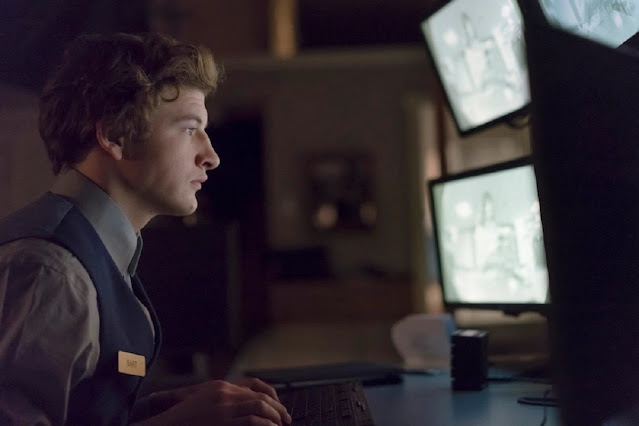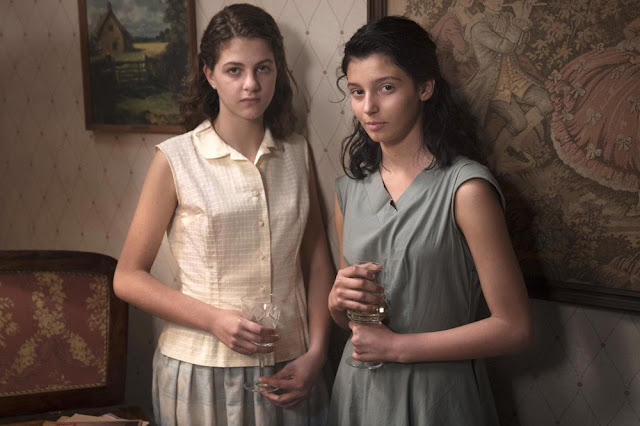Fantasma vuelve al pueblo / Homecoming Ghost
(Español / English)
En medio de tanto
telefilme pretencioso o altisonante pero vacío o emocionalmente neutro de las
plataformas de streaming, el cine argentino, y más concretamente un cine
provincial, vuelve a regalarnos una muestra de lo que mejor sabe hacer cuando
no pretende volverse mainstream: contarnos historias “pequeñas” que interesan y
conmueven y que desde lo local interpelan al mundo a través de una comedia con
un humor sutil que coquetea por momentos con el absurdo sobre un retorno con más
pena que gloria al pueblo natal.
Demóstenes (llamado Fantasma por sus amigos), ya con 40 años, vuelve al pueblo de Aristóbulo del Valle, en Misiones, dispuesto a trabajar de lo que sea, después de intentar estudiar y hacerse un camino “lejos del pago”.
Fantasma vuelve al pueblo es la crónica de los
reencuentros y encuentros del protagonista (un notable Alfonso Tort) y de su
experiencia como empleado temporario en un locutorio propiedad de quien fuera
su mejor amigo, Luis Miguel (Juan Román Diosque), a quien le va económicamente
bien.
El carácter episódico del relato no le quita interés, destacándose una pintura de personajes (comenzando por Fantasma y su amigo) lograda con gran economía de recursos, los certeros apuntes, como al pasar, sobre ciertas transformaciones y corruptelas que vive el pueblo y ese humor distante y a veces triste que no lo abandona casi nunca.
En medio de tanto telefilme pretencioso o altisonante pero vacío o emocionalmente neutro de las plataformas de streaming, el cine argentino, y más concretamente un cine provincial, vuelve a regalarnos una muestra de lo que mejor sabe hacer cuando no pretende volverse mainstream: contarnos historias “pequeñas” que interesan y conmueven y que desde lo local interpelan al mundo.
Y que brinda, a la vera de una ruta y con la notable banda
sonora de Federico Delbon, una de las mejores escenas sin palabras del último
cine nacional.
......................................................................
In the midst of so much
pretentious or bombastic but empty or emotionally neutral telefilm on streaming
platforms, Argentine cinema, and more specifically a provincial cinema, once
again gives us a sample of what it does best when it does not intend to become
mainstream: tell us stories " small ”that interest and move and that, from
the local, challenge the world through a comedy with a subtle humor that flirts
at times with the absurd about a return with more pain than glory to the
hometown.
Demosthenes (called Ghost by his friends), now 40 years old, returns to the town of Aristóbulo del Valle, in Misiones, ready to work whatever it takes, after trying to study and find a way "far from paying."
Fantasma returns to town is the chronicle of the reunions and encounters of the protagonist (a notable Alfonso Tort) and of his experience as a temporary employee in a parlor owned by his former best friend, Luis Miguel (Juan Román Diosque), who likes financially well.
The comedy directed by missionary Augusto Gonzalez Polo admirably combines a very measured manners -thanks to the great naturalness of the performances, highlighting that of Laura Josefina Kramer- with a subtle humor that at times flirts with the absurd and even the disturbing and a measured melancholy that never recharges the inks. A cinema that at times refers to Carlos Sorín, but devoid of sentimentality.
The episodic nature of the story does not detract from its interest, highlighting a painting of characters (starting with Ghost and his friend) achieved with great economy of resources, the accurate notes, as in passing, about certain transformations that the people are experiencing and that distant humor that almost never leaves it.
In the midst of so much pretentious or bombastic but empty or emotionally neutral telefilm on streaming platforms, Argentine cinema, and more specifically a provincial cinema, once again gives us a sample of what it does best when it does not intend to become mainstream: tell us stories " small ones ”that interest and move and that challenge the world from the local level.
And that offers, by the side of a route and with the
remarkable soundtrack of Federico Delbon, one of the best scenes without words
of the last national cinema.




Comentarios
Publicar un comentario
Mensajes sujetos a moderación